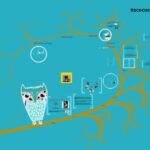In our rapidly evolving digital landscape, the term “digital citizen” has gained prominence. A digital citizen is someone who Productive and Efficient utilizes technology to engage with the world, enhancing their productivity and efficiency in both personal and professional spheres. As we delve into what it means to be a digital citizen, we will explore the tools and strategies that can maximize productivity and foster a more efficient lifestyle.
Understanding Digital Citizenship
Digital citizenship encompasses responsible and ethical use of technology. It involves being aware of one’s online presence, engaging with digital communities, and leveraging technology to make informed decisions. A digital citizen is not just a consumer of information; they are also active contributors to the digital ecosystem.
The Pillars of Digital Citizenship
- Digital Literacy: Understanding how to find, evaluate, and use information effectively is crucial. Digital literacy goes beyond basic computer skills; it involves critical thinking and the ability to discern credible sources.
- Digital Communication: Effective communication in a digital environment is essential. This includes understanding the nuances of various platforms, from email etiquette to social media interactions.
- Digital Rights and Responsibilities: A digital citizen recognizes their rights to privacy and freedom of expression while also understanding their responsibilities to respect others online.
- Digital Security: Protecting personal information and being aware of cybersecurity threats is vital. This involves using strong passwords, recognizing phishing attempts, and knowing how to secure personal data.
- Digital Footprint: Every action online leaves a trace, or digital footprint. Being mindful of this footprint can help individuals manage their online reputation and privacy.
How Technology Enhances Productivity
Technology serves as a powerful ally for digital citizens seeking to enhance their productivity. With the right tools and strategies, individuals can streamline their tasks, manage their time more effectively, and collaborate seamlessly with others. Here are some key ways technology contributes to productivity:
1. Task Management Tools
Digital citizens can leverage task management applications such as Todoist, Trello, or Asana to organize their workload. These tools allow users to break down projects into manageable tasks, set deadlines, and prioritize effectively.
Benefits:
- Clear Organization: A visual representation of tasks helps users understand what needs to be done at a glance.
- Collaboration: Many of these tools allow team collaboration, enabling members to assign tasks and track progress collectively.
2. Time Management Apps
Effective time management is crucial for productivity. Apps like RescueTime and Focus@Will help users monitor their time usage and identify areas for improvement.
Benefits:
- Awareness: By tracking time spent on various activities, individuals can identify time-wasting habits.
- Focus Enhancement: Certain apps use music and ambient sounds to help users concentrate better, maximizing their work output.
3. Cloud Computing
Cloud services like Google Drive, Dropbox, and OneDrive offer storage solutions that enable users to access their files from anywhere, on any device. This flexibility is particularly beneficial for remote work and collaboration.
Benefits:
- Accessibility: Files can be accessed from any device, making it easier for individuals to work on the go.
- Collaboration: Cloud platforms allow multiple users to edit documents in real-time, facilitating teamwork.
4. Communication Platforms
Effective communication is a cornerstone of productivity. Platforms like Slack, Microsoft Teams, and Zoom enable real-time communication, reducing the need for lengthy email exchanges and meetings.
Benefits:
- Instant Communication: Quick messaging and video conferencing can resolve issues faster than traditional methods.
- Integration: Many communication platforms integrate with other tools, streamlining workflows.
5. Automation Tools
Automation tools like Zapier and IFTTT can significantly enhance productivity by automating repetitive tasks. By setting up workflows that connect different applications, users can save time on routine activities.
Benefits:
- Efficiency: Automating repetitive tasks allows users to focus on more strategic activities.
- Consistency: Automation ensures that tasks are completed in a consistent manner, reducing errors.
Strategies for Being a Productive Digital Citizen
While technology provides the tools, the way we utilize them is critical for maximizing productivity. Here are some strategies that digital citizens can adopt:
1. Set Clear Goals
Establishing specific, measurable, achievable, relevant, and time-bound (SMART) goals is essential. Clear goals provide direction and help individuals prioritize their tasks effectively.
2. Embrace the Pomodoro Technique
The Pomodoro Technique involves working in focused sprints (typically 25 minutes), followed by short breaks. This method can enhance concentration and reduce burnout.
3. Limit Distractions
Digital distractions are ubiquitous. Techniques such as turning off non-essential notifications, setting specific times for checking email, and creating a dedicated workspace can help minimize interruptions.
4. Leverage Collaboration
Collaboration tools allow teams to work together more efficiently. Regular check-ins and clear communication channels foster a collaborative environment, enhancing overall productivity.
5. Continuous Learning
The digital landscape is constantly evolving. Engaging in continuous learning through online courses, webinars, and digital communities can keep digital citizens ahead of the curve.
The Role of Mindfulness in Digital Citizenship
As digital citizens immerse themselves in technology, the need for mindfulness becomes paramount. Being mindful about technology usage can prevent burnout and enhance overall well-being. Here’s how mindfulness plays a role in productivity:
1. Digital Detox
Regular breaks from technology can rejuvenate the mind and increase focus when returning to work. This can involve setting specific times to unplug or engaging in offline activities.
2. Mindful Communication
Taking the time to craft thoughtful responses in digital communications fosters better relationships and reduces misunderstandings. This approach can enhance collaboration and teamwork.
3. Reflective Practices
Regular reflection on one’s digital habits can lead to more intentional use of technology. Journaling or meditation can help individuals understand how they interact with digital tools and make necessary adjustments.
Challenges Faced by Digital Citizens
While being a digital citizen offers numerous advantages, it also comes with challenges. Understanding these obstacles is crucial for developing effective strategies to overcome them.
1. Information Overload
With the vast amount of information available online, digital citizens may feel overwhelmed. The challenge lies in filtering out noise and focusing on relevant content.
2. Cybersecurity Threats
As reliance on technology increases, so do the risks associated with cybersecurity threats. Digital citizens must stay informed about potential risks and take proactive measures to secure their data.
3. Work-Life Balance
The lines between work and personal life can blur in a digital environment. Establishing boundaries and unplugging after work hours is essential for maintaining a healthy balance.
Conclusion
In conclusion, being a digital citizen in today’s technology-driven world requires a thoughtful approach to using digital tools and resources. By leveraging technology for productivity and efficiency, individuals can enhance their personal and professional lives. However, it is equally important to remain mindful of the challenges that accompany digital citizenship. Embracing continuous learning, effective communication, and responsible online behavior will empower digital citizens to thrive in an increasingly interconnected world. As we move forward, let us harness the power of technology while upholding the values of digital citizenship, ensuring a productive and efficient future for all.






